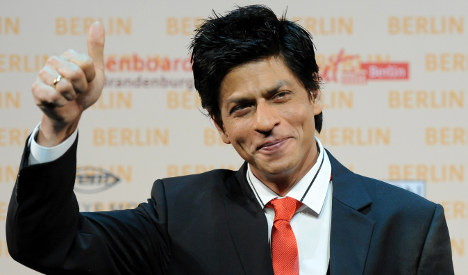“Every time I come here it’s very cold and then I feel the warmth of lovely German bodies against me … I’m really happy to work in this atmosphere,” said the superstar at a press conference in a chilly, drizzly Berlin.
“The city is one of the most beautiful cities I have ever seen … I have been here for two weeks and I don’t feel I’m working,” he added.
“I’m just happy to be in Berlin. I love it. If you told me to stand up on a tourist bus and dance, I would do it.”
Khan is on location in Berlin to shoot his new film, “DON-2”, billed by producers as a “Bollywood version of Bond.”
The film features Khan in his old role as Don, the “unbeatable, unstoppable, smartest, smoothest gangster in the Asian drug world.” Viewers are promised “an edge-of-the-seat thriller, with a riveting plot and breathtaking action.”
“DON-2” is being shot for 50 days in prominent venues in the German capital, including its Olympic Stadium and the East Side Gallery, a long, graffiti-strewn section of the Berlin Wall.
Director Farhan Akhtar said he hoped to introduce a German audience to the Bollywood genre.
“We’re not holding back as far as the Bollywood punches are concerned. We are throwing them all. There are many films shot in London, Australia, the US. But it’s important to showcase new places. Berlin had it all.”
The overall budget of the film was €12 million ($17 million) of which just over half was spent in Berlin. German authorities provided around two million dollars to support the film.
Known as “King Khan”, the 44-year-old actor is one of the most popular in Bollywood, with millions of loyal fans. He was once nominated one of the world’s 50 most important people in the world by Newsweek magazine.
The city of Berlin, already a magnet for film producers, hopes that Khan’s star power will encourage other Bollywood productions to be filmed in the capital, in turn boosting tourism from India’s burgeoning middle class.
Recent film stars in Berlin include Brad Pitt in Quentin Tarantino’s “Inglourious Basterds”, Tom Cruise in “Valkyrie” and Kate Winslet in “The Reader” and the city hopes to cash in on Bollywood’s pulling power.
The chief executive of the “visitBerlin” campaign, Burkhard Kieker, said: “DON-2 will be our advertising campaign for India.”
“With this film we want to enthuse a multimillion audience for the destination of Berlin and, in this way, secure our breakthrough on the Indian market.”
Khan said he was certain the Berlin authorities would get their wish.
“After the film is released, I fully believe that many Indians will come and deservedly so, because Berlin is so wonderful. You guys are going to a big problem getting all the Indians to go back. They will be everywhere,” he said. “You don’t know what you have let yourselves in for.”
“DON-2” is the sequel to the 2006 “Don: The Chase Begins Again”, itself a remake of the Bollywood classic film of the same name. It is due to premier in cinemas at the end of 2011.
AFP/mry



 Please whitelist us to continue reading.
Please whitelist us to continue reading.
Member comments